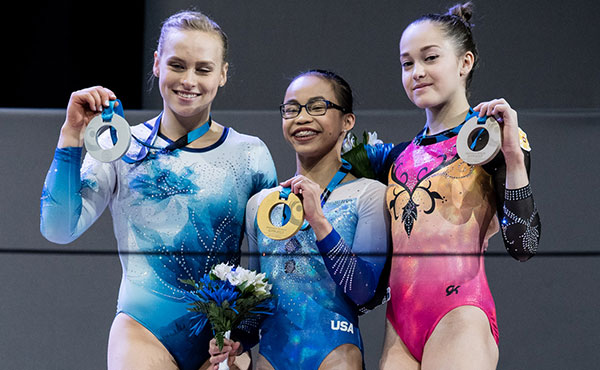
- Women’s All-Around Final Results
- Hurd’s Routines & Interview
- Webcasts: World Feed + Other Routines | World Feed Only
- Photo Gallery
MONTREAL, Quebec, Canada, Oct. 6, 2017 – Morgan Hurd watched on as the capacity crowd shrieked in excitement, certain they had just witnessed history in the making.
Canada’s Elsabeth Black had just completed her floor exercise and 10,000 fans seemed certain the local favorite had done enough to give Canada its first-ever all-around Worlds medal – a gold.
“The anticipation was killing me,” Hurd said.
The wait was worth it.
The 16-year-old Hurd ultimately triumphed to extend the United States dominance at the competition with a fifth-straight gold after teammate and all-around favorite Ragan Smith was forced out to injury. The U.S. women have not lost a World or Olympic all-around gold medal since 2010.
Hurd edged Black by 0.100 to follow in the footsteps of American greats Simone Biles, Jordyn Wieber and Kim Zmeskal with an improbable triumph under the dome of the Olympic Stadium – site of Nadia Comaneci’s historic performance 41 years ago.
“It’s crazy that I was even competing here and to win is the most surreal feeling in the world,” Hurd said with a beaming smile moments after accepting her medal from Comaneci following tears of joy. “It honestly means the world for me. I was so humbled to be picked for the team. So to qualify and win the gold means everything to me.”
Hurd’s small stature is no testament to her mental fortitude, as she stayed focused amid Smith’s injury drama, which occurred while warming up for her opening event: vault.
“It was very tough. Devastating,” national team coordinator Valeri Liukin said of events that transpired before the start of Friday’s final. “Very difficult. But, again, there’s another (champion).”
With Smith’s unexpected exit, the weight of expectation from a program that has dominated the all-around since 2011 was suddenly dropped onto Hurd’s tiny shoulders.
“It didn’t affect me too much, but I still kept her in the back of my head,” said Hurd, who began the final on vault. “I focused on what I needed to do out there.”
Hurd, in her trademark glasses, did not bat a lash as she stuck into her routine with gusto and execution and offered up a worthy adversary despite her rookie status. Despite qualifying sixth, there was no reason to take her lightly considering the leaders – like her – were mostly strangers to major international podium success.
She started with an encouraging 14.533 on the vault, needing a small hop to land a clean double-twisting Yurchenko. Japan’s Mai Murakami – the qualifying leader who was also vying for her first major international podium finish – stayed top with a vault of 14.666.
Hurd moved ahead of her Japanese opponent on the uneven bars with a crisp routine, although the tiniest of movements on her landing left her score at 14.300. Black joined her as co-leader at 28.833 at the halfway point.
Murakami fell out of contention with an ill-timed fall on the balance beam, and for the first time, nerves appeared to creep into Hurd’s own routine as she sensed her moment on the beam.
“I was a little shaky but I’m just happy I stayed on,” she said after overcoming wobbles on perhaps her strongest element to tally 12.660. Her overall score of 41.499 through three events kept her on top until Black moved ahead by 0.200 going into the finale, where the difficulty of Hurd’s routine made the difference.
The Delaware native opened the floor exercise with a double-double before a piked full-in with a hop back. Despite touching out of bounds on the close of her front layout to double full, she finished with a double pike for 13.733 and an overall tally of 55.232.
Then, it was a long wait.
“I tried not to pay attention but my eyes kind of wandered,” said Hurd, forced to wait through five other routines after going first.
Ultimately, Black came up short on her routine to leave Hurd in an initial state of shock before the celebrations began.
“It feels so crazy,” she said.




